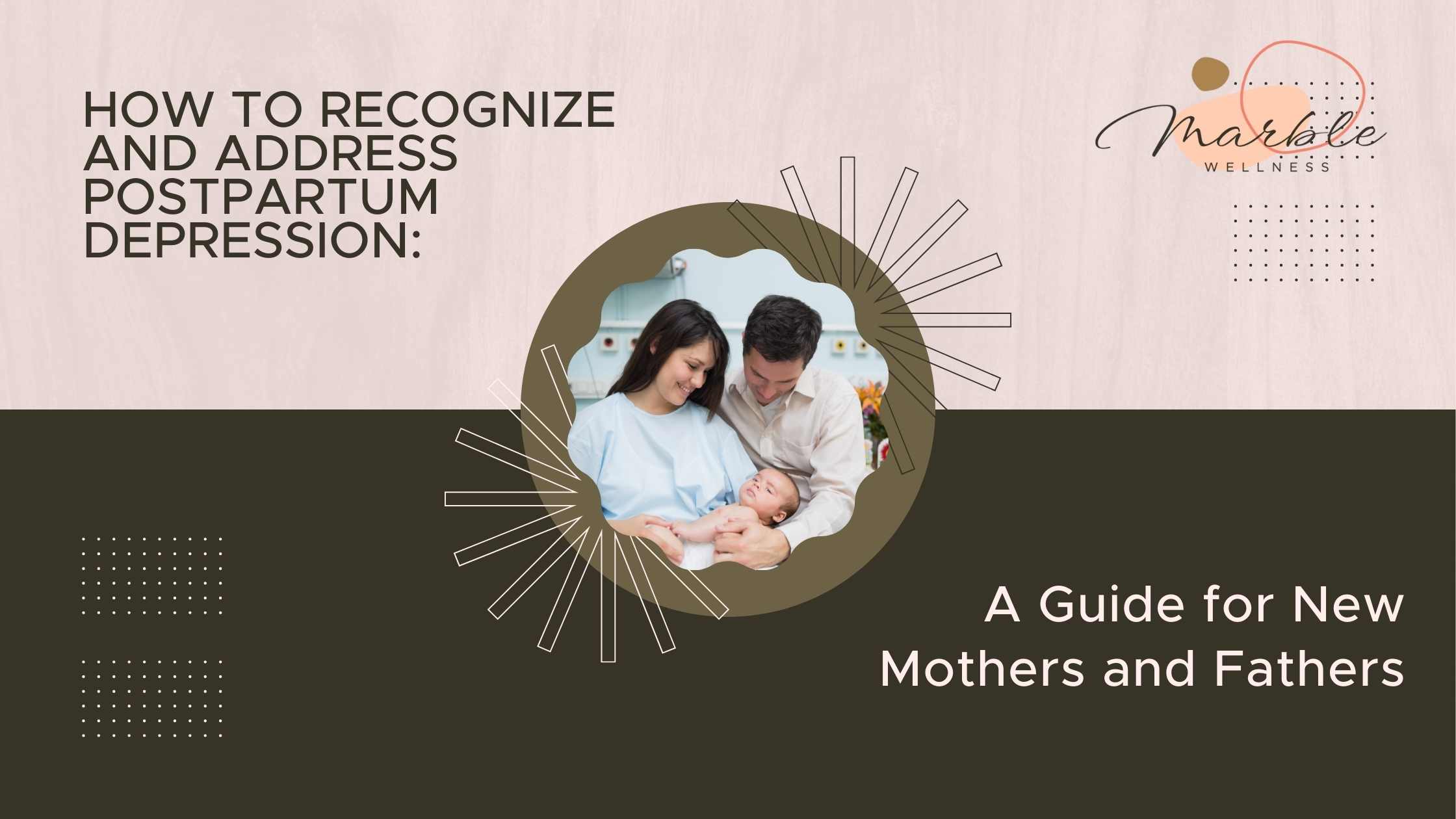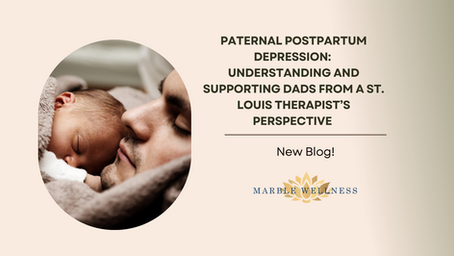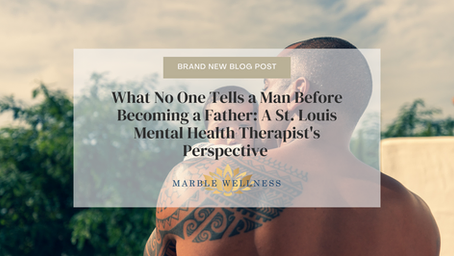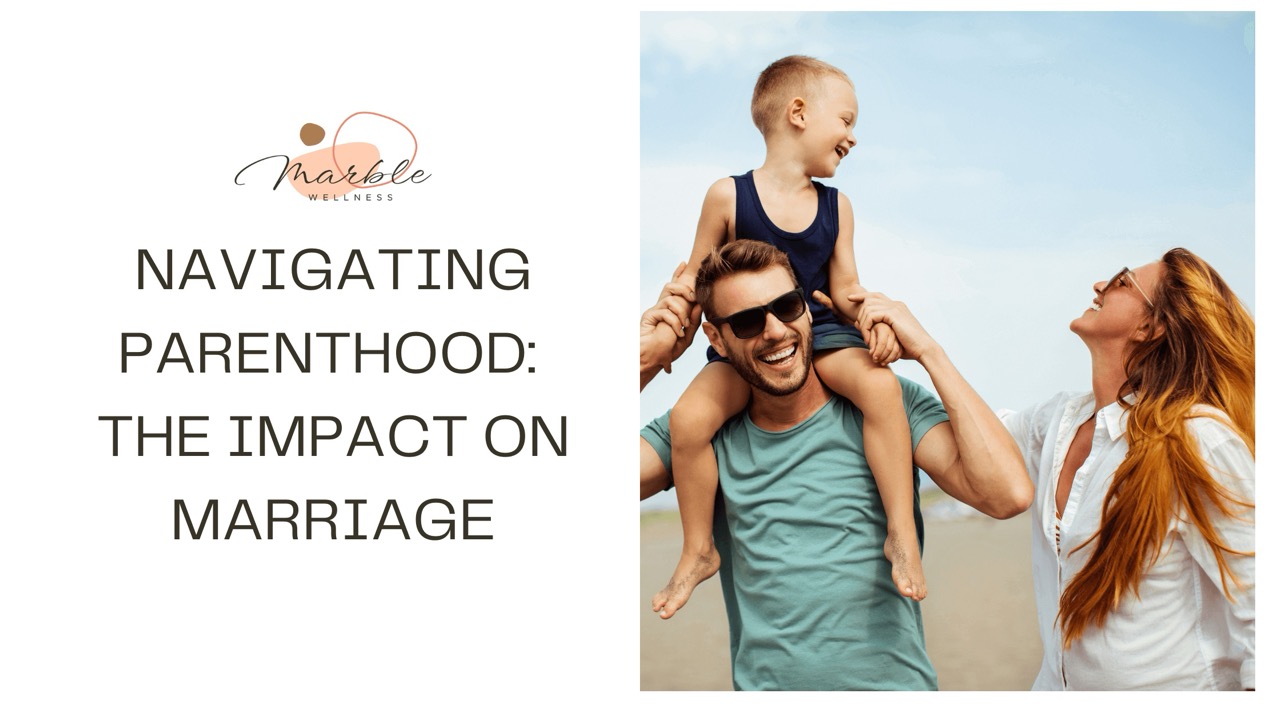Welcoming a new baby is a life-changing event filled with joy and excitement-but it can also bring unexpected emotional challenges. Postpartum depression (PPD) affects many new parents, not just mothers but fathers as well. If you’re a new mom or dad in St. Louis, Ballwin, Chesterfield, or nearby, understanding the signs of postpartum depression and knowing how to seek help can make a significant difference for your well-being and your family’s health.
At Marble Wellness, we want to help you recognize the symptoms of postpartum depression and provide compassionate strategies to address it. This post offers detailed insights and real-life examples to support both mothers and fathers through this difficult but treatable condition.
What Is Postpartum Depression?
Postpartum depression is a mood disorder that can occur anytime within the first year after childbirth, affecting approximately 1 in 7 mothers and about 1 in 10 fathers. Unlike the “baby blues,” which usually resolve within two weeks, PPD involves more intense and longer-lasting feelings of sadness, anxiety, and exhaustion that interfere with daily life and parenting.
PPD can affect anyone adjusting to parenthood, regardless of gender, and recognizing it early is key to recovery.
Recognizing Postpartum Depression in Mothers
New mothers often experience a range of emotions after birth, but PPD symptoms are more severe and persistent. Common signs include:
- Persistent sadness or feelings of emptiness
- Intense guilt or feelings of inadequacy as a mother
- Loss of interest or pleasure in activities once enjoyed
- Difficulty bonding with the baby or feeling detached
- Changes in appetite or sleep patterns (too much or too little)
- Fatigue or loss of energy beyond normal exhaustion
- Difficulty concentrating or making decisions
- Anxiety or panic attacks
- Thoughts of harming oneself or the baby
For example, Sarah, a new mom from Chesterfield, shared how she felt overwhelmed by sadness and guilt. She found herself avoiding her baby’s gaze and doubting her ability to care for her child. These feelings persisted beyond the first few weeks, signaling the need for professional support.
Recognizing Postpartum Depression in Fathers
Though less talked about, fathers can experience postpartum depression too, often with different symptoms. According to research, about 10% of new dads face PPD, sometimes triggered by hormonal changes, sleep deprivation, or feeling disconnected from their partner and baby.
Common paternal PPD symptoms include:
- Irritability, anger, or sudden outbursts
- Withdrawal from family and social activities
- Increased risk-taking or substance use
- Fatigue and low motivation
- Physical symptoms like headaches or stomach issues
- Difficulty concentrating or making decisions
- Feelings of worthlessness or hopelessness
Mark, a new dad in Ballwin, described feeling “on the outside” of the parenting experience. He coped by working longer hours and withdrawing emotionally, which strained his relationship with his partner. Recognizing these signs helped him seek counseling and rebuild a connection with his family.
Why Addressing Postpartum Depression Matters
Untreated postpartum depression can affect your health, your relationship, and your child’s development. Research shows that parental depression is linked to:
- Less attentive caregiving and missed pediatric appointments
- Increased behavioral and emotional problems in children
- Strained marital or co-parenting relationships
Seeking help early not only improves your well-being but also creates a healthier environment for your baby to thrive.
How to Address Postpartum Depression
Recognizing postpartum depression is an important first step, but knowing how to address it is equally vital. The good news is that postpartum depression is treatable, and many parents find relief through a combination of professional support, self-care, and community connection. Taking action early can help you regain emotional balance and restore your confidence as a parent. Below are several effective strategies that new mothers and fathers can use to begin healing and rebuilding their well-being.
1. Reach Out for Professional Support
Therapy, such as cognitive-behavioral therapy (CBT) or interpersonal therapy (IPT), has proven effective in treating PPD. Marble Wellness offers specialized counseling for new parents in the St. Louis area, providing a safe space to explore your feelings and develop coping skills.
2. Consider Medication When Appropriate
Some parents benefit from antidepressant medications, especially when symptoms are severe. Always discuss options with a healthcare provider to find a safe and effective plan.
3. Build a Support Network
Connect with family, friends, or local parent groups. Sharing your experiences reduces isolation and provides practical help. Partners can also attend therapy together to strengthen communication and mutual support.
4. Prioritize Rest and Self-Care
Sleep deprivation worsens depression symptoms. Share nighttime duties if possible, nap when the baby sleeps, and engage in gentle physical activity. Nourish your body with balanced meals and hydration.
5. Open Communication with Your Partner
Discuss your feelings honestly. Fathers and mothers may experience PPD differently, but supporting each other is crucial. For example, couples can schedule regular check-ins to share emotions and coordinate caregiving.
More Examples of Addressing Postpartum Depression in Real Life
- Emily and Jake from St. Louis noticed Emily’s mood changes and Jake’s withdrawal after their daughter was born. They sought couples therapy at Marble Wellness, which helped them understand each other’s struggles and improve teamwork in parenting.
- Lisa, a mom in Kirkwood, found relief by joining a postpartum support group and practicing mindfulness exercises daily. She also worked with a therapist to address her anxiety and build confidence as a mother.
- David, a first-time dad in Chesterfield, recognized his irritability and substance use as signs of PPD. With professional help, he learned healthier coping strategies and reconnected with his family.
When to Seek Immediate Help for Postpartum Concerns
While postpartum depression can often be managed with therapy and support, there are situations that require urgent medical attention. If you or your partner experience thoughts of harming yourself or your baby, severe mood swings, hallucinations, confusion, or disorientation, these may be signs of postpartum psychosis–a rare but serious mental health emergency. Immediate intervention is critical to ensure safety and provide appropriate treatment. Don’t hesitate to call 911, go to the nearest emergency room, or contact your healthcare provider right away. Remember, seeking help in these moments is a courageous and necessary step to protect both you and your family.
Consider Seeking Postpartum Depression Support in the St. Louis Area
Postpartum depression is a common but serious condition that affects both mothers and fathers. Recognizing the signs and seeking timely support can transform your experience of parenthood and strengthen your family bonds. You’re not alone in this journey. With the right support, you can overcome postpartum depression and embrace the joys of parenting with renewed strength.
Postpartum Depression Therapy in the St. Louis Area
If you’re a new parent in St. Louis or surrounding areas feeling overwhelmed, Marble Wellness is here to help. Our compassionate postpartum therapists specialize in perinatal mental health and can guide you toward healing and hope. Not only do we have a team of therapists in Ballwin, MO, but we have also recently expanded to serve the Lake St. Louis and Wentzville area! Reach out to our Client Care Coordinator today to discuss your therapy options, both in-person and via online therapy in Missouri.
Contact Us!
Learn About Our Group Offerings

Additional Counseling Services at Marble Wellness in St. Louis, MO
Marble Wellness Counseling services are designed to help set you on a path of living a more fulfilled, calm, and happy life. Our St. Louis area therapists have a variety of training backgrounds and areas of expertise. We specialize in anxiety, depression, grief, chronic illness, therapy for men, couples, and maternal overwhelm. Our practice also helps new moms with various postpartum concerns, moms in the thick of parenting, and moms with teens. We can also chat from wherever you are in the state with online therapy in Missouri. No matter where you are in your journey, we are here to help you thrive!



